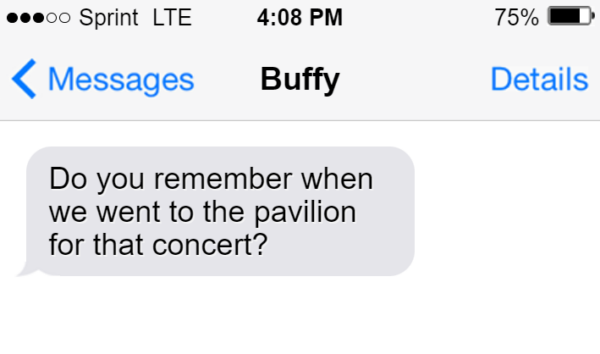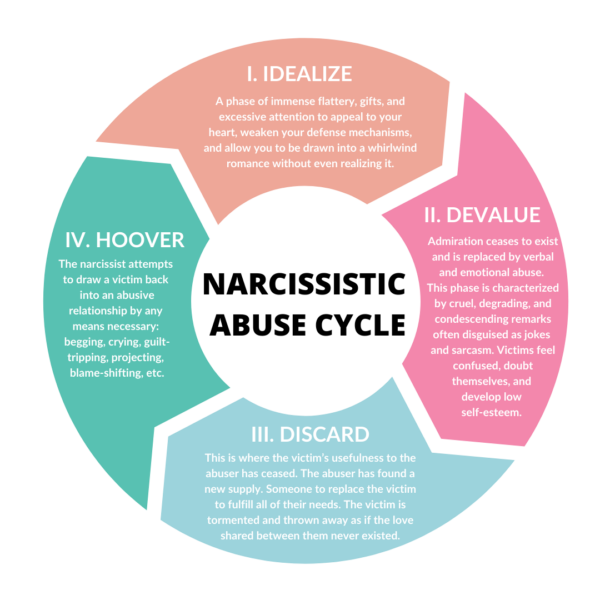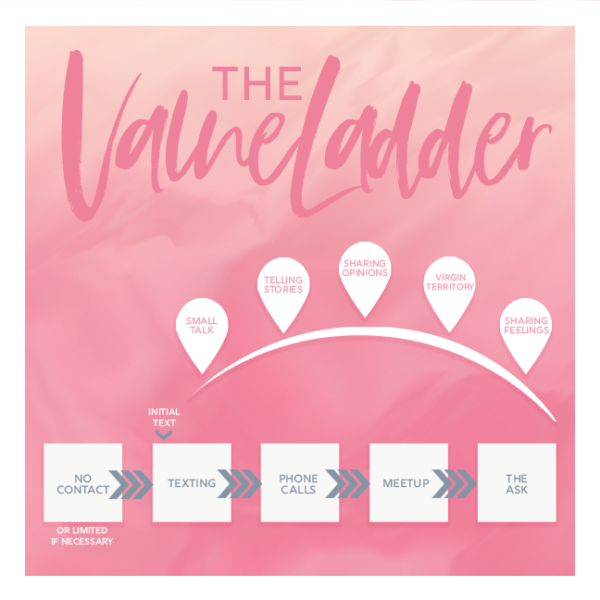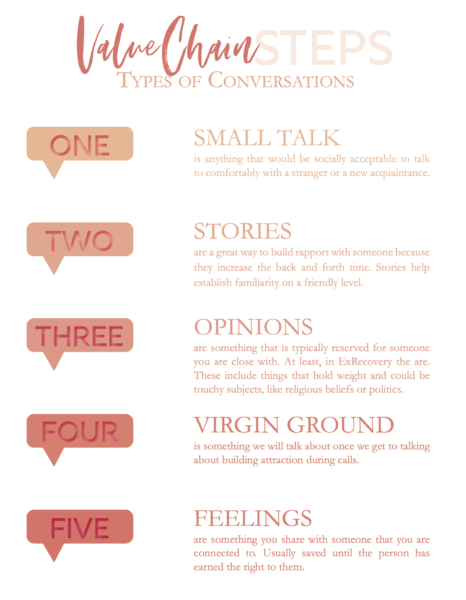Without a doubt one of the things our clients struggle with the most is learning how to build or maintain rapport after their ex is talking to them again.
Today that’s what I want to focus on by answering the following questions,
- What It Probably Means If Your Ex Is Talking To You Again
- What I Believe To Be The Best Way To Build Rapport Is
- Why You Need To Shoot For “Big Talk” Instead Of “Small Talk”
- The Types Of Questions You Should Be Asking Them
Let’s start!

What Are Your Chances of Getting Your Ex Boyfriend Back?
Take the quizWhat It Probably Means If Your Ex Is Talking To You Again
When an ex starts talking to you again, it can mean a variety of things depending on the context, their intentions, and the nature of your past relationship.
I believe the reasons why exes start to communicate again can be condensed into six distinct categories.
- Friendship
- Reconciliation
- Closure
- Support or Help
- Loneliness or Boredom
- Manipulation
Let’s discuss these.
Reason #1: Friendship
They may simply want to maintain a positive connection with you.
This is likely if your breakup was amicable. Sometimes, sufficient time has to pass for both parties to move on before reaching out to maintain a bond of friendship.
Reason #2: Reconciliation
Our website is titled Ex-Boyfriend Recovery because we want to help you recover from the breakup, and many of our clients want their exes back.
And yes, if your ex is talking to you again and things are going well, it can mean they’re interested in getting back together.
This is highly probable if they initiate conversations about your past relationship and express any type of regret or longing throughout.
A lot of times, you’ll see them say, hey, do you remember when we did this or when we did that via text message,
Those are prime examples of that regret taking root.
Reason #3: Closure
Sometimes they can reach out to you for closure. You know, they might feel like there are unresolved issues or emotions from your relationship, and they’re seeking closure or understanding about how things went.
Most of the time, exes who want closure are not the ones who have been the dumpers.
They’re the ones who have been the dumpees.
A particular segment of our client base breaks up with their exes and then expresses regret later on.
But their ex wants nothing to do with them.
After some time, when their ex starts talking to them again, a lot of times, they just want some type of closure.
They want to understand why you broke up with them.

What Are Your Chances of Getting Your Ex Boyfriend Back?
Take the quizReason #4: Looking For Support Or Help
Suppose they’re going through a callous time. In that case, they might reach out because they consider you someone who can provide emotional support or advice for them.
Though one of the things that I tell my clients is not to fall too much into the trap of helping them with their problems.
Because usually, if you have been dumped, helping the dumper with their problems is giving them a benefit of a relationship without any kind of commitment required from them.
And so what they’ll do is they’ll use you for that emotional support.
This happens often with individuals who have moved on to new people.
Maybe that new person is not sufficiently helping them or supporting them emotionally compared to how you were.
And so they kind of come back “to the well.”
They come back to old faithful.
But they don’t have to be in a committed relationship with you because they have this committed relationship with someone else.
- So they use this other person for maybe the physical benefits of a relationship.
- And then they use you for the emotional benefits of the relationship.
So I often tell my clients to acknowledge the problem but don’t fix the problem.
Reason #5: Reach Out Based On Loneliness Or Boredom
If they’re feeling lonely or bored, they might reach out to you because you’re familiar.
This is particularly true during times of crisis or when they’re in between relationships.
It also echoes my example about using someone for emotional support above.
Often, especially if your relationship was habitual, they communicated with you at the same time every single day, discussing the same topics.
This was a comfort for them. After the breakup, this pattern gets disrupted, leading them into a mild panic because their usual routine is upset, which they find unsettling.
As a result, they might come to you because they’re either lonely or bored due to the lack of established patterns.
Reason #6: Manipulation
Unfortunately, some people might reach out to their exes to manipulate or play on their feelings, especially if this was a pattern in your past relationship.
This is very similar to the narcissistic abuse cycle that we tend to see some clients go through.
The best way to look at this narcissistic abuse cycle is there are three or sometimes four different revolutions or stages.
- Idealize
- Devalue
- Discard
- Repeat
You have this idealize stage.
This is where they idealize you in their head, but they’re also saying all the right things. They’re doing all the right things to get you to commit.

What Are Your Chances of Getting Your Ex Boyfriend Back?
Take the quizAnd then, once you have committed, they devalue you.
They make you feel horrible about yourself.
They put you down, gaslight you, you name it, and then they discard you.
And then, as they go through that discarding phase, they roll back around to the idealize phase, and they just keep doing this repeatedly.
Want to know the wildest part?
Exes that are reaching out to you, for this reason, might not be aware that they’re consciously manipulating you.
Or sometimes, even when I point out to individuals that they’re doing this, they staunchly deny it.
But that’s why I think this is so embedded into their personality or how they’ve handled relationships that many aren’t even aware they’re doing it.
This is just a natural way of life for them.
But to others, it is seen as manipulation to idealize someone, then devalue them, discard them, then idealize them again, and then on and on and on again.
Let’s Talk About The Struggle Or Rapport Building
Without a doubt, especially for our clients, following a breakup, the challenging part isn’t necessarily adhering to the no-contact rule where you ignore your ex.
Yes, I acknowledge that a large portion of our client base has failed the no-contact rule at least once.
And I’ve done countless articles and videos about the danger of failing no contact multiple times,
People struggle with it.
However, the truly difficult part comes after the no-contact rule: Specifically with how you build rapport and handle similar situations.
When discussing the most effective way to build rapport, we often deal with a scenario where your ex has reinitiated contact.
They’re talking to you again, but you need to figure out your next steps.
I can easily sit here and say, implement the value ladder or value chain approach.
There’s a graphic that I often talk about on my website that details our entire process to the breakup.
It’s based on this value ladder concept. You’re trying to build value as you progress from one stage to the next through the mediums of conversations and the specific types of discussions you engage in.

What Are Your Chances of Getting Your Ex Boyfriend Back?
Take the quizBut what isn’t talked about is what’s the best way to create that value.
And I think probably the best way to create that value can be found in a
Ted Talk with a woman named Kalina Silverman.
The Importance Of “Big Talk” Instead Of “Small Talk”
Now Kalina Silverman has this exciting idea.
She talks about the importance of big talk as opposed to small talk.
- Small talk is all about kind of these polite conversations, but they’re usually about unimportant or uncontroversial matters.
- Big talk is deep, meaningful conversations about important issues that also help you get to know the other person better.
Her argument is that you should shoot for big talk, especially if you want to build rapport with someone, establish a meaningful connection, or stand out to them.
And because we’re talking about a situation where you are talking to your ex again, you might be past that small talk phase.
Big talk is something that you need to master.
Now what are the elements of big talk?
The Three Elements Of Big Talk
Well, there are three.
If you’re going to move from small talk to big talk, you need to:
- Choose universal topics. Any human being could respond to these subjects, regardless of the external factors that define them.
- Ensure your ‘big talk’ questions are open-ended, eliciting more than just a ‘yes’ or ‘no’ response and an opportunity to hear a story.
- Finally, ‘big talk’ should be meaningful. It goes beyond small talk, allowing you to delve beneath the surface and discuss matters of significance.
So ask better questions, ask bigger questions, and don’t be afraid to be vulnerable because your vulnerability can be contagious.
Your Vulnerability Can Be Contagious
A perfect example is in that TED Talk YouTube video that I referenced above.
The founder of this idea of big talk, or at least the person that is most recognizable behind this movement, Kalina Silverman, tells a really interesting story.
She says,
And another question for you guys: have you ever been out at a party or event or with your friends or someone, and that person is like, hey, let’s take a picture. And even though you weren’t in the mood to take a picture, you didn’t feel that great. You still smiled in the picture, and it ended up making it to Facebook, and everyone saw it, and you’re like, that was the upset event. And so that’s what happened in this picture. And also this picture, when I was out of the party that same week and saw these pictures that made it onto Facebook, I was smiling at them. All my friends saw them, and they’re like, wow, that looks like you’re having a really great time in college. And that’s not really how I felt on the inside.
She referenced this story of a time when she was sad and depressed at this party, but she looked happy when she wasn’t feeling that way inside.
She’s being vulnerable, and because she’s vulnerable, it can make you connect with her more.
It can be contagious.
How often have we been in a very similar situation?
As I was listening to this party story, I thought,
“I felt like that before”
And it makes you want to share your story.
So sometimes the best way to get an ex to be vulnerable, to build rapport, is to share a story like this, to be vulnerable, and expect that vulnerability to be contagious.
You Also Need To Learn To Ask The Right Questions At The Right Time
But it’s also about asking the right type of questions.
Kalina argues that you should bypass the small talk and get straight to the big talk if you consider rapport building as a whole.
While I mostly agree, particularly in the context of breakups, a bit of small talk is necessary initially.
This is the essence of the value chain: starting with small talk, progressing to telling stories, sharing opinions, and so forth.
You need this slight progression before you can engage in big talk.
So, for the most part, Kalina is right: small talk isn’t the primary foundation for rapport building; big talk is.
However, small talk does serve a purpose, as it paves the way for big talk.
People generally struggle with big talk because they’re adept at small talk.
So, what are some examples of the best big talk, open-ended questions that can elicit meaningful responses and build strong rapport?
Here are 10 of my favorite examples.
- What’s the most important life lesson you’ve learned so far?
- Can you share a personal challenge you’ve overcome and how it has shaped you?
- What is something that you are passionate about and why?
- If you could change one thing about your past, what would it be and why?
- How do you handle stress or pressure in your life?
- What does success mean to you?
- What’s the biggest risk you’ve ever taken and what did you learn from it?
- If you could have dinner with anyone, alive or dead, who would it be and why?
- What are some goals or dreams you have for your future?
- Can you tell me about a person who has greatly influenced your life?
The idea behind these examples is to prompt conversation with questions like, ‘What’s the most important life lesson you’ve learned so far?’
This open-ended question encourages a meaningful discussion on a significant topic, rather than typical small talk.
Consider the examples I’ve provided, and my advice to you is to implement these ‘big talk’ conversations when building rapport with your ex.
I anticipate you’ll notice your ex beginning to open up more, improving rapport, and possibly becoming more attached to you because you’re asking questions that no one else is asking – questions you probably didn’t ask during your relationship.



